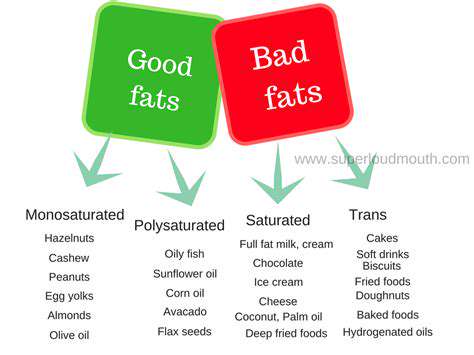Understanding Healthy Fats: Incorporating Good Fats
Jun 22, 2025 / btwgardenmachine/

Incorporating Healthy Fats into Your Daily Routine

Choosing the Right Healthy Fats
When adding healthy fats to your diet, selecting options that provide nutritional benefits while enhancing flavor is key. Monounsaturated and polyunsaturated fats should be your primary focus since they support vital bodily functions like hormone synthesis and cellular repair. Excellent choices include avocados, various nuts and seeds, and high-quality olive oil. These ingredients not only boost the nutrient density of meals but also improve taste and texture.
It's important to consider how these fats interact with other foods. For example, while nuts add a pleasant crunch and rich flavor, olive oil offers a smoother consistency. The ideal fat source depends on personal preference and how well it complements the dish. The goal is to enhance, not overpower, the natural flavors of your food.
Benefits of Healthy Fats in Your Diet
Including healthy fats in meals offers numerous advantages. They significantly increase satiety, helping you feel full longer and potentially reducing unnecessary snacking. This effect can be particularly helpful for weight management efforts. Additionally, these fats are essential for absorbing fat-soluble vitamins (A, D, E, and K) that support various physiological processes.
Beyond these benefits, healthy fats contribute to maintaining optimal cholesterol levels and supporting cognitive function. They're fundamental building blocks for cell membranes and play crucial roles in cellular communication, hormone regulation, and inflammation control throughout the body.
Practical Ways to Include Healthy Fats
Start by adding small quantities of healthy fats to your meals and adjust based on your preferences. A teaspoon of almond butter, a light sprinkling of flaxseeds, or a modest drizzle of avocado oil can dramatically improve a meal's nutritional value. Trying different combinations allows you to discover flavors and textures that work best for your palate while optimizing health benefits.
Get creative with your preparations. Blending avocado into sauces creates rich, creamy textures, while mixing various seeds adds interesting crunch. These simple modifications let you personalize meals while significantly enhancing their nutritional profile.
Important Considerations
While healthy fats are beneficial, moderation remains crucial. Excessive consumption of even healthy fats can contribute to unwanted weight gain, so balance them with other macronutrients and be mindful of portion sizes. All calories, regardless of source, can affect weight if consumed in excess.
Always be aware of potential food allergies or sensitivities. Some people may react to nuts, seeds, or other common sources of healthy fats. Carefully read ingredient labels and consult with a healthcare professional if you have specific dietary concerns or health conditions that affect fat metabolism.
The Role of Healthy Fats in Specific Health Goals
Cardiovascular Health Improvement
Including healthy fats like those found in olives, walnuts, and fatty fish can significantly benefit heart health. These fats help regulate cholesterol levels by reducing LDL (harmful cholesterol) while supporting HDL (beneficial cholesterol), thereby decreasing cardiovascular risk. Pairing these dietary choices with regular physical activity creates a powerful strategy for maintaining heart health.
Enhancing Cognitive Performance
Omega-3 fatty acids, particularly abundant in salmon, chia seeds, and walnuts, are crucial for brain health. These essential nutrients support neuron development and maintenance, directly impacting memory, learning capacity, and overall cognitive function. Regular consumption may help protect against cognitive decline associated with aging.
Weight Management Support
Contrary to outdated beliefs, appropriate amounts of healthy fats can actually support weight control. Their satiating effect helps regulate appetite, potentially reducing overall calorie consumption. When combined with their role in nutrient absorption and metabolic regulation, they become valuable components of any weight management plan.
Hormonal Balance Maintenance
Many hormones require fatty acids for their synthesis and proper function. Insufficient intake of essential fats can disrupt endocrine balance, affecting everything from metabolism to stress response. A varied diet including diverse fat sources helps maintain optimal hormonal activity.
Immune System Support
Healthy fats contribute to immune competence by maintaining cell membrane integrity and modulating inflammatory responses. Omega-3s particularly demonstrate anti-inflammatory properties that may help regulate immune function and protect against certain disorders.
Skin Health Promotion
Dietary fats significantly influence skin condition by supporting moisture retention and elasticity. Regular consumption of foods rich in essential fatty acids, such as salmon, almonds, and olive oil, can lead to visibly healthier, more vibrant skin.
Nutrient Absorption Enhancement
Fat-soluble vitamins (A, D, E, and K) require dietary fats for proper absorption and utilization. Including healthy fat sources with meals containing these vitamins ensures your body can effectively use these crucial nutrients for various physiological functions.